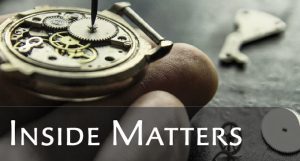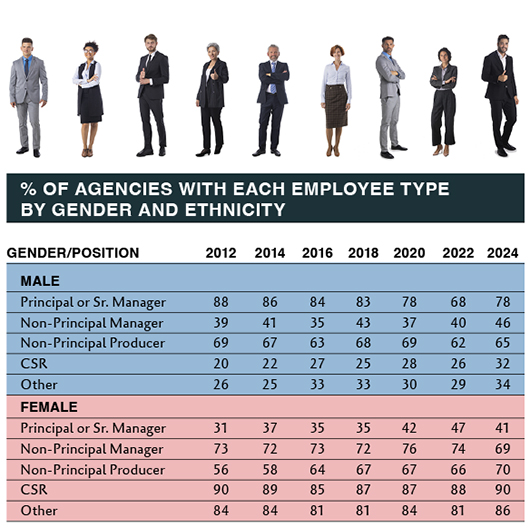 Exploring gender bias in
Exploring gender bias in
the independent agency system
[O]ne’s gender seems to have more than a little to
do with your current and future position in the agency.
By Cheryl Koch, CPCU, ARM, AAI, ACSR, AFIS, and Mary Belka, CPCU, ARM, ARe, RPLU, CIC
Spoiler alert! If you have not yet seen the movie based on Mattel’s iconic doll, you may want to skip this paragraph (but please read the balance of the article!). Ken is living the good life in Barbie Land, a matriarchy in which he plays a very minor and somewhat insignificant role but, of course, he doesn’t know any better because he’s never lived anywhere else.
Fast forward to Ken applying for a job as an account manager at his local independent insurance agency. This is his dream come true—wherever he looks, men are in charge; but as an account manager, he is a fish out of water! Among the agency’s account managers, he is the only man, and he wonders what is going on. Surely, he must be qualified to be a producer or even an agency owner—after all, he’s a guy.
Barbie comes to the same agency in hopes of being hired as a producer—her dream come true. Likewise, she is a fish out of water; among the agency’s producers, she would be the only woman. Why isn’t she qualified to be a producer or agency owner? Afterall, she can do anything or be anything—can’t she?
Well, Ken and Barbie, welcome to the independent agency business where one’s gender seems to have more than a little to do with your current and future position in the agency.
We sometimes present anecdotal evidence to you when it comes to agency operations, and we will continue to do that in this article as well, since we have been keen observers of the industry for half a century. But in this case, we’re going to also rely on the data provided by the Big “I” (Independent Insurance Agents & Brokers of America) and their recently released 2024 Agency Universe Study.
One of the issues this bi-annual study examines is that of gender and ethnic bias in the industry. For now, we will focus only on gender and leave ethnicity for another article, coming soon. Certainly, if the Big “I” thought there was a problem, they would not be comfortable releasing this information. Yet in study after study, the data shows that we are not really moving the needle on gender bias in the agency business.
We examined data between 2012 and 2024 using the Big “I” Agency Universe Study. This study has been conducted bi-annually since the 1980s and, although we do not have data going back that far, it would be interesting to know how the last twelve years compare to all those that came before. Our hunch is it would be similar. Following (and in a chart on the next page) is data related to gender based on agency position.
Note the way the question is posed: How many women and men work in each type of position at your agency? Don’t try to make it add up to 100%, because that would entail a different question (what percentage of your agency’s producers are male, for example).
We have failed to find a definition in any of the studies of what is a “senior manager,” but we assume this means a sales or operations manager, as opposed to a commercial, personal or employee benefits department manager. If true, it will help explain why such a small percentage of senior managers are women, while a fairly large number of non-principal managers are female.
As you can see, when it comes to gender in agency ownership or leadership, women have made some strides; but given that there are as many women as men on the planet, it just hasn’t been equal. While the number got nearer to 50% in 2022, it quickly declined back to a more “traditional” number of 41%. Yet when we look at the numbers of non-principal managers and, especially, CSRs (customer service representatives), it is clearly female dominated, so it begs the question: Are these individuals being offered senior manager or ownership positions for which they may be qualified, or have they hit the proverbial glass ceiling when it comes to promotion?
We are heartened by the seeming parity among non-principal producers, but here’s where the anecdotal evidence comes in. We just completed the last of three new producer schools over the last year for a major insurance carrier. In each class, there was but one female and, believe us, it was noticed by the company’s management.

We are heartened by the seeming parity among non-principal producers, but here’s where the anecdotal evidence comes in. We just completed the last of three new producer schools over the last year for a major insurance carrier. In each class, there was but one female and, believe us, it was noticed by the company’s management.
So, there may be parity among the 1,269 agencies that participated in this year’s Agency Universe Study, but this does not seem to be true across the board. Or, at least, there is work to be done to help agencies recruit talented females into insurance sales.
Some examples follow of young women who would shine as insurance sales or management professionals:
- Elise is always the top salesperson at a nationally known department store in the cosmetics department in Seattle. She is a master of cross-selling and alerting her clients to upcoming special offers. No one leaves her counter with just the item they came to buy; her product knowledge is legendary.
- Stacia is a young single mother who recruits employees for a fast-growing tech firm in Nebraska. Her ability to persuade top talent to make a career change and join their firm has made all the difference. Her efforts are not compensated as well as they might be in yet another male-dominated industry.
- Gina is working in the “gig” economy as an Uber driver in Florida, where she goes above and beyond to develop and expand her client base. Her vehicle is immaculate, the journey perfectly smooth, and she provides bottled water and other small touches to make the ride an “experience.” She is saving for a better vehicle to rise into the “luxury” ride tier to increase her income.
These individuals may not resemble the traditional producers or managers of the past, and yet each excels at sales and managing in their current environments. Each is entrepreneurial and driven to succeed. Producers and leaders seem difficult to find, and yet they are hiding in plain sight if we expand our view of what could be.
The complete imbalance between males and females in the CSR (account manager) position also bears some scrutiny. What we have heard loud and clear over the last few years and was borne out in prior Agency Universe Studies is that the independent agency system has a talent problem. Well, perhaps here’s the answer everyone’s been waiting for: If you think only women can fill that position competently, you’re probably going to continue to have that problem for the foreseeable future!
We’ve simply got to break this bias. We offer up the following as examples of young men who would likely make outstanding account managers:
- Ernest is working at an AT&T store in New Jersey with no career path there. He was outside on a break as I approached the store. He immediately got up, reached for the door, and asked what he could help me with. He could see that I was in a bit of a panic, and his calm demeanor and problem-solving focus helped settle me down. I left that store an AT&T customer for life.
- Jordan is a waitperson at a New York City restaurant. His anticipation skills were off the chart. It was almost as though he could read our minds and managed to deliver everything we wanted or needed even before we asked, and he did it all with a huge smile on his face. He earned himself a nice tip.
- Jeramie is a Delta Airlines flight attendant. He greeted each first-class passenger by name and noted something about their status with the airline. Before we landed, he visited each person to thank them for their continued loyalty to Delta. And as we deplaned, he again thanked us each by name.
What do these young men all have in common? They work for companies they probably will never own. They don’t really have the opportunity to build long-term relationships with their customers or to affect their financial future. But what they do have are the customer service skills that make a great account manager. Their gender shouldn’t prevent them from sharing in what our industry has to offer.
So, welcome to the agency, Ken and Barbie! We think you’re both going to fit in here just fine, excelling at the agency job that is the best match for your talents, as soon as we wrap our minds around the fact that there is no place for the kind of gender bias that has existed in the past.
The authors
Cheryl Koch is the owner of Agency Management Resource Group, a California firm providing training, education and consulting to producers, account managers and owners of independent agencies. She has a BA in Economics from UCLA and an MBA from Sacramento State University. She has also earned several insurance professional designations: CPCU, CIC, ARM, AAI, AAI-M, API, AIS, AAM, AIM, ARP, AINS, ACSR, AFIS, and MLIS.
Mary M. Belka is owner and CEO of Eisenhart Consulting Group, Inc., providing management and operations consulting to the insurance industry. She also is an endorsed agency E&O auditor for Swiss Re/Westport. A graduate of the University of Nebraska, Mary holds the CPCU, ARM, ARe, RPLU, CIC, and CPIW designations.




